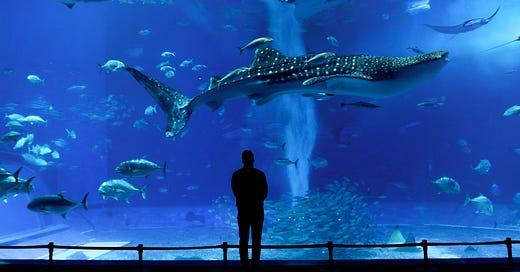I’ll blame Neil Postman for my inclination toward environmental metaphors. Or maybe it comes from my 10 years as an environmental journalist. I’m not sure. But regardless, I do like comparing child-raising to the natural world.
It started with Postman’s book Technopoly, in which the renowned media theorist and social critic described technology as being ecological. He said the presence of technology completely changes an environment. You don’t get an old bioregion plus a new species; you get a whole new bioregion because you have altered the conditions. There are new interactions between species, new predator-prey dynamics, new competition for resources.
That description always stuck with me. So, perhaps that is why I loved educator and writer Erika Christakis’ description of a “comprehensive childhood habitat” in her book The Importance of Being Little. She explained that children need an optimized learning zone in which to develop well, and that that zone—or habitat—is currently “being encroached and endangered, in small increments.”
Christakis was writing about school-based learning and declines in American education, but her concerns could easily be applied to the current phone-based childhood that’s tragically become status quo. She then offered a paragraph that resonated deeply with me:
“We need to start treating young children as essential apex creatures whose care and feeding affects the whole fiber of society. The loss of young children’s learning habitat—a habitat that includes both the ability and the opportunity to explore and connect—is a real threat to our society’s future.”
It is counterintuitive to think of children as apex creatures. They’re so little, curious, vulnerable, and underdeveloped, compared to adults. They have yet to become the thinkers and actors and leaders that we assume they’ll become someday. And yet, as Christakis points out, the way in which they turn out has profound effects on a society, precisely because of those future roles they’ll take on.
Training the Apex Creature
The way I interpret it is, if we shelter and coddle excessively, or even allow children to engage excessively in “experience blockers”, aka smartphones, social media, and video games, they risk missing out on the fundamental and formative experiences that result in being a well-balanced adult. Too many hours on a screen take time away from the daily rehearsal for adulthood that, up until 15 years ago, was presumed to be a given.
To view children as apex creatures is, in some ways, the opposite of how they’re treated today. A quick scroll through Instagram suggests that kids are viewed either as fragile, sensitive beings whose emotional whims must be prioritized above all else, or as obnoxious, out-of-control mini-monsters who make their parents’ lives a living hell. It’s an odd dichotomy.
Meanwhile, we need to find a sensible middle ground where children are viewed as up-and-coming leaders and have childhoods complete with plenty of low-stakes risks, sufficient challenges, and achievable high standards to help them become confident and capable.
Because I can’t resist another environmental metaphor, I’ll throw in the idea that a child is also like an indicator species. These are highly sensitive species that can give early warning signs about changes in a natural habitat that pose a threat. The well-being of children (which we know to be at an all-time low, thanks to Haidt’s and Twenge’s work) indicates that whatever we’re doing to them, however we’re raising them right now, is not working all that well. We need a new approach.
The Advantage of Retrospection
I think we are at a pivotal moment in time. Most of us who are raising kids right now can remember what childhood was like in pre-smartphone times. Soon those memories will be lost to the past, which is why we have a responsibility to impart them to our children, not simply by recounting them, but by recreating them and making them the norm once again.
“When you raise a child, you’re also raising your grandchild and your great-grandchild.” I can’t remember where I read that, but it’s another phrase that has stuck in my head. It’s easy to think of parenting as a one-off: “Just launch this kid into the world and my job’s done!”
But it’s necessary for us to remind ourselves, as parents, that the lessons we impart to a particular child will be the model for their own approach to parenting, years down the road. That’s scary, when you stop to think about it, but also sort of exciting.
Children have not changed evolutionarily in the past 15 years, but we have changed their environment profoundly. Any creature that has adapted to a certain way of living over millions of years cannot change their needs that quickly. If we want children to thrive, we must consider what they need and how we can provide that to them.
We must protect our apex creatures for the good of all.
You Might Also Like:
It’s Hard to Be THAT Parent
It’s the Adults, Not the Kids!
Consider the Washing Machine




